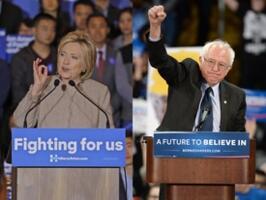Hillary Meter: Primary Losses Don’t Break Clinton’s Momentum
Despite losing seven straight state primaries to Vermont Senator Bernie Sanders in the past month, Hillary Clinton is seen by more voters than ever as the eventual Democratic nominee.
The latest Rasmussen Reports monthly Hillary Meter finds that 91% of Likely Democratic Voters think Clinton is likely to be their party’s presidential nominee in 2016. This includes 62% who say it is Very Likely, up just a point from last month but still the highest number of Democrats who consider Clinton’s nomination Very Likely in monthly surveys since July. Just eight percent (8%) now feel the former secretary of State is not very or Not At All Likely to win the nomination. (To see survey question wording, click here.)
The latest survey was conducted the night prior to and the night of the Democratic debate in New York City last Thursday.
Among all Likely Voters, 84% believe Clinton is the likely Democratic nominee, with 53% who say it is Very Likely. That ties the highest finding since last July. Fifteen percent (15%) disagree, but this includes only six percent (6%) who say she is Not At All Likely to be nominated.
By comparison, 67% of voters believe Donald Trump is the likely Republican nominee, while 48% think Texas Senator Ted Cruz is more likely to be nominated. Just 16% say Ohio Governor John Kasich is likely to win the GOP nomination.
(Want a free daily e-mail update? If it's in the news, it's in our polls). Rasmussen Reports updates are also available on Twitter or Facebook.
The survey of 1,000 Likely Voters was conducted on April 13-14, 2016 by Rasmussen Reports. The margin of sampling error is +/- 3 percentage points with a 95% level of confidence. Field work for all Rasmussen Reports surveys is conducted by Pulse Opinion Research, LLC. See methodology.
Clinton and Sanders challenged each other’s qualifications to be president in Thursday’s debate. Democrats see Clinton as the more qualified of the two, but voters in general are more critical of both candidates’ credentials.
Democratic voters also put more trust in Clinton than Sanders when it comes to key issues.
Fifty-five percent (55%) of all voters believe Clinton in political terms is a liberal. Twenty-nine percent (29%) say she is a moderate, while just six percent (6%) describe her as conservative. These findings have changed little from past surveys, but in Rasmussen Reports’ first Hillary Meter – in April 2005 during her last run for the presidency - 43% said Clinton was liberal, 34% moderate and eight percent (8%) conservative.
Among Democrats, just 32% consider Clinton politically liberal; 48% think she’s moderate and 14% conservative. Seventy-five percent (75%) of Republicans and 59% of voters not affiliated with either major party say Clinton is a liberal.
Forty-eight percent (48%) of Republican voters say it’s Very Likely Clinton will end up the nominee, showing no change from last month. But 48% of unaffiliated voters also share this view, up 10 points from the previous survey.
Members of the establishment in both major political parties worry that supporters of Trump and Sanders will not align with the party’s eventual nominee if their guy isn't chosen, but that appears to be a much more serious problem for Republicans than for Democrats.
The presidential primary process to choose the Democratic nominee includes the use of superdelegates, individuals selected by the party who can support any candidate at the party's convention regardless of who wins their state's popular vote. Sanders' supporters complain that the system favors Clinton. Just over half of Democrats cry foul at the superdelegate system.
Additional information from this survey and a full demographic breakdown are available to Platinum Members only.
Please sign up for the Rasmussen Reports daily e-mail update (it's free) or follow us on Twitter or Facebook. Let us keep you up to date with the latest public opinion news.
The survey of 1,000 Likely Voters was conducted on April 13-14, 2016 by Rasmussen Reports. The margin of sampling error is +/- 3 percentage points with a 95% level of confidence. Field work for all Rasmussen Reports surveys is conducted by Pulse Opinion Research, LLC. See methodology.
Rasmussen Reports is a media company specializing in the collection, publication and distribution of public opinion information.
We conduct public opinion polls on a variety of topics to inform our audience on events in the news and other topics of interest. To ensure editorial control and independence, we pay for the polls ourselves and generate revenue through the sale of subscriptions, sponsorships, and advertising. Nightly polling on politics, business and lifestyle topics provides the content to update the Rasmussen Reports web site many times each day. If it's in the news, it's in our polls. Additionally, the data drives a daily update newsletter and various media outlets across the country.
Some information, including the Rasmussen Reports daily Presidential Tracking Poll and commentaries are available for free to the general public. Subscriptions are available for $4.95 a month or 34.95 a year that provide subscribers with exclusive access to more than 20 stories per week on upcoming elections, consumer confidence, and issues that affect us all. For those who are really into the numbers, Platinum Members can review demographic crosstabs and a full history of our data.
To learn more about our methodology, click here.




